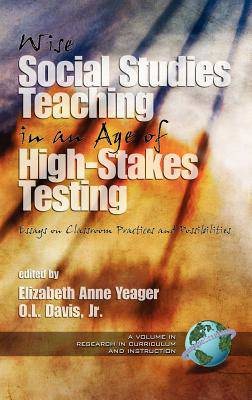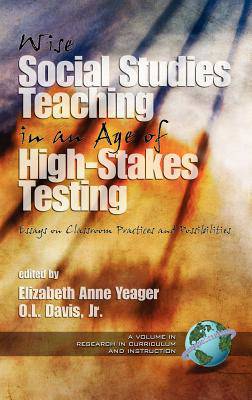
- Afhalen na 1 uur in een winkel met voorraad
- Gratis thuislevering in België vanaf € 30
- Ruim aanbod met 7 miljoen producten
- Afhalen na 1 uur in een winkel met voorraad
- Gratis thuislevering in België vanaf € 30
- Ruim aanbod met 7 miljoen producten
Zoeken
Wise Social Studies in an Age of High-Stakes Testing
Essays on Classroom Practices and Possibilities (Hc)
€ 152,45
+ 304 punten
Omschrijving
The chapters in this volume illustrate how teachers are bringing creativity, higher-order thinking, and meaningful learning activities into particular school settings despite pressures of standards and testing. We chose the word wise for the title of this book, and we use it frequently to describe the pedagogical practices we have identified. The words powerful and ambitious are used as well. The larger point, as Keith C. Barton makes in his chapter, is that there is no necessary connection between content standards and high-stakes tests on the one hand, and low-level, rote instruction on the other. He reminds us, as Thornton (1991) and Wiggins (1987) previously have argued, that teachers play a crucial role in mediating educational policy, and their intentions and interpretations have at least as much influence on classroom practice as does the content of standards and highstakes tests. Barton also asserts that this makes it all the more crucial to identify the wisdom of practice that enables teachers...to engage students in powerful educational experiences.
Specificaties
Betrokkenen
- Uitgeverij:
Inhoud
- Aantal bladzijden:
- 220
- Taal:
- Engels
- Reeks:
Eigenschappen
- Productcode (EAN):
- 9781593113735
- Verschijningsdatum:
- 1/06/2005
- Uitvoering:
- Hardcover
- Formaat:
- Genaaid
- Afmetingen:
- 156 mm x 234 mm
- Gewicht:
- 485 g

Alleen bij Standaard Boekhandel
+ 304 punten op je klantenkaart van Standaard Boekhandel
Beoordelingen
We publiceren alleen reviews die voldoen aan de voorwaarden voor reviews. Bekijk onze voorwaarden voor reviews.










